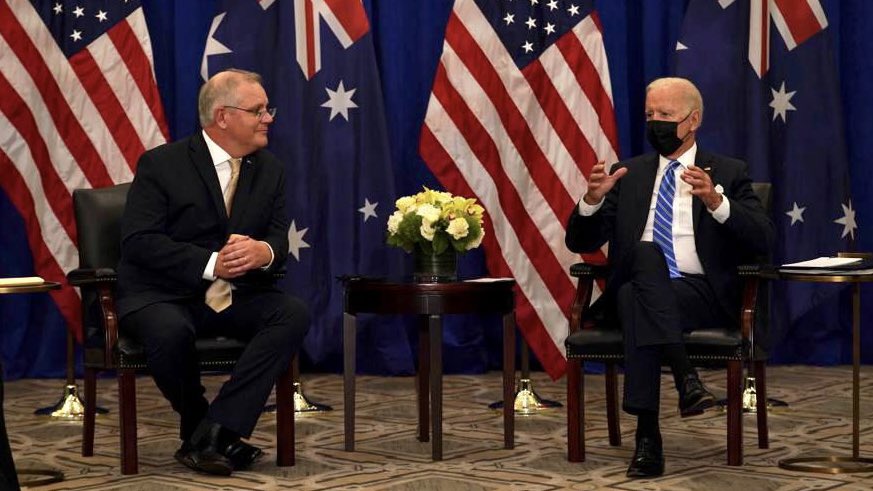Nuclear Submarine Deal Embodies Shifting International Relations
Last week, the United States announced a new trilateral security partnership with Australia and the United Kingdom known as AUKUS. The first goal of the alliance is to provide the Australian military with a fleet of nuclear submarines to replace the outdated technology they had previously been using.
The announcement of the alliance should have been a cause for a celebration, but quickly turned into an international scandal. The French, who previously had a submarine deal with the Australians, were not informed of the new partnership until hours before the information was released to the public.
The French, claiming that the Americans had betrayed them, recalled their ambassadors from both the US and Australia and cancelled a state dinner in Washington.
The French omission from AUKUS suggests a new international order that is being created in the wake of the U.S. withdrawal from Afghanistan.
Following the French backlash, President Biden reached out to French President Emmanuel Macron in order to smooth tensions, resulting in the ambassador being sent back to their position.
Many journalists have accused the French of overreacting, citing the fact that the U.S. deal was simply a better option than the French one, since it provides better caliber technology. While many, including the Biden administration, concede that the French should have been informed at an earlier date in the deal-making process, there’s no reason for this to cause a long-lasting breach in U.S.-French diplomatic relations.
One of President Biden’s major campaign promises was to place more pressure on the Chinese government, which has increasingly become more hostile toward U.S. interests. One of the reasons the U.S. withdrew from Afghanistan was to be able to focus more resources on competing with China.
International relations are shaping up to look like a second Cold War, this time with the United States against China. The U.S. is tightening its relations with its closest allies, especially in the Pacific Ocean.
France is clearly trying to avoid aggravating either country, thus ensuring the best economic prospects for the European Union. In a post-Afghanistan world, that may no longer be possible.
The French were not the only government upset about the new submarine deal; the Chinese publicly complained about the alliance as well, suggesting that it accelerates the nuclear arms race.
In the Cold War, the French were firmly allied with the United States against the USSR. This time around, France belongs to the EU, an economic alliance with its own unique diplomatic goals that do not always mesh with U.S. interests.
While the U.S. wants to take a harsher stance on China, many EU countries — France included — want to maintain a balance between the two countries, and avoid antagonizing either. After all, many EU member states have economic interests in China. They cannot afford to solely support one side or the other.
France and Germany declared China a security risk at the last North Atlantic Treaty Organization (NATO) summit, but they also signed an investment deal with the Chinese government. This deal came despite criticism about Chinese government actions against pro-democracy protesters.
One of the central priorities of the EU is to maintain Europe’s influence as an actor on the world stage. Both the Americans and the Chinese have a tendency to nudge other countries out of the spotlight when it comes to alliances.
Allying themselves with the Americans against the Chinese would mean the French would once again take a “junior partner” status in the global conflict, something the European Union wants to avoid.
AUKUS is only the first step. Both the United States and China will continue to invest in new weapons, strengthen their ties to allies and seek to undermine the other on an international scale. These tensions will only continue to rise. France’s attempt to remain somewhat neutral in regard to foreign relations will only become increasingly more difficult.
The United States has allied themselves with the UK and Australia because these countries have remained constant in their support for U.S. policy against the Chinese government. The French, as well as the EU as a whole, have remained tepid in their outright support for either China or the U.S. The time is coming, however, when France will have to pick a side.
Let’s hope they choose wisely.
Michael Sluck, FCRH ’24, is a political science and computer science major from Verona, N.J.

Michael Sluck is a senior from New Jersey majoring in political science and computer science. He has been copy editing for The Fordham Ram for the entirety...










































































































































































































